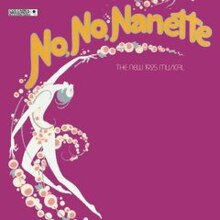No, No, Nanette
| No, No, Nanette | |
|---|---|

1971 Revival Recording
|
|
| Music | Vincent Youmans |
| Lyrics |
Irving Caesar Otto Harbach |
| Book |
Otto Harbach Frank Mandel 1971: Burt Shevelove |
| Basis | Emil Nyitray and Frank Mandel's play My Lady Friends |
| Productions | 1925: West End 1925: Broadway 1971: Broadway revival |
| Awards | Drama Desk Award for Outstanding Book |
No, No, Nanette is a musical comedy with lyrics by Irving Caesar and Otto Harbach, music by Vincent Youmans, and a book by Otto Harbach and Frank Mandel, based on Mandel's 1919 Broadway play My Lady Friends. The farcical story involves three couples who find themselves together at a cottage in Atlantic City in the midst of a blackmail scheme, focusing on a young, fun-loving Manhattan heiress who naughtily runs off for a weekend, leaving her unhappy fiancé. Its songs include the well-known "Tea for Two" and "I Want to Be Happy".
During its 1924 pre-Broadway tour, No, No, Nanette became a hit in Chicago, and the production stayed there for over a year. In 1925, the show opened both on Broadway and in the West End, running 321 and 665 performances respectively. Film versions and revivals followed. A popular 1971 Broadway revival, with a book adapted by Burt Shevelove, led to the piece becoming a favorite of school and community groups for a time.
A popular myth held that the show was financed by selling baseball superstar Babe Ruth to the New York Yankees, resulting in the "Curse of the Bambino." However, it was My Lady Friends, rather than No, No, Nanette, that was directly financed by the Ruth sale.
No, No, Nanette was not successful in its first pre-Broadway tour in 1924. When the production arrived in Chicago, producer Harry Frazee re-cast the show with new stars, had the book rewritten and asked Youmans and Caesar to write additional songs. These additional songs, "Tea for Two" and "I Want to Be Happy", would become the hit songs of the show. The Chicago production was a hit and ran for over a year. Frazee eagerly capitalized on this success, but Broadway was not his first priority. The London production opened in the West End on March 11, 1925 at the Palace Theatre, where it starred Binnie Hale, Joseph Coyne and George Grossmith, Jr. and became a hit, running for 665 performances. The London production featured two songs that were not included in U.S. productions: "I've Confessed to the Breeze" and "Take a Little One-Step". Three touring productions were circulating throughout the U.S. when the Broadway production finally opened on September 16, 1925, starring Louise Groody and Charles Winninger. It ran for 321 performances.
...
Wikipedia
